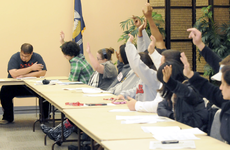According to the state of Louisiana open meeting laws, the Student Government Association Senate went into an executive session illegally during Monday’s regularly scheduled meeting. The SGA executive board requested those members who were not in the Student Senate to leave the room so that they could break into an executive session, which is closed to the public.
For an executive session to be legally held, two-thirds of the members present must vote to go into the session. With this, the reason for breaking into the closed executive session must be announced. Neither of the above was done before breaking into the session.
University College senator Brady Chiasson, freshman from Thibodaux, said that the executive board decided to go into the executive session and neither a vote was taken nor a time for objections given. There was also never a statement or reason given as to why the executive session was called.
On Tuesday, The Nicholls Worth called SGA president Brittany Taraba and asked why SGA went into an executive session. While she did not give out specifics of what was discussed, she did say that “SGA productivity” was the topic.
However, productivity is not one of the reasons SGA can break into an executive session, according to the Louisiana Sunshine Laws. “‘Sunshine’ is a term often used to describe laws that help citizens monitor and participate in the business of government,” according to the Public Affairs Research Council.
The Sunshine Laws for open meetings in Louisiana states that information on “lawsuits, security matters, extraordinary emergencies, investigations of misconduct and discussions about a person’s character, competence or mental health” are the only subjects in which executive sessions may be held.
“If I had known all of the technicalities then we would have done it,” Taraba said on Wednesday afternoon.
Chiasson said that Eugene Dial, vice president for student affairs and enrollment, told SGA vice president John Lombardo that Lombardo was not following guidelines by not publicly announcing the subject of the executive session before it occurred.
Chaisson said that the topic of the session was the executive board and Student Senate’s reactions to the editorial in last week’s issue of The Nicholls Worth.
In the session, Taraba told SGA members that if they had a problem with the editorial to look at themselves, Chiasson said, and that they can change how they appear to students. He said that she stated that due to the lack of motions, it might look as though SGA has not been productive. Chaisson said that about 47 motions have been written this semester, about 37 of which were written by Dolly McGreever, SGA secretary, and only four of which were not from executive board members. Most of the motions were about appointing senators, Chiasson said. Taraba told SGA members that the weekly meetings are a public forum to officially let students know what is being done, even if the information is redundant to the Senate, Chiasson said.
“An executive session did not need to be called for. I think it was called just because the press was there, but it was public information, and I don’t see why Brittany, or John, really, called for an executive session,” Chiasson said.
On Tuesday, The Nicholls Worth requested the meeting’s minutes to see what was discussed during the executive session. However, minutes were not taken during the executive session because it was considered closed.
“I don’t see why it’s not in the minutes,” Chaisson said. “There was no reason for it to be private. That’s why we have minutes. We need to know what happened. What about senators who were not there? They need to know too.








